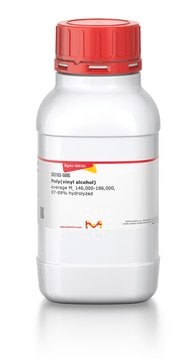W217506
Isobutyl acetate
FCC, FG
Synonym(s):
Acetic acid isobutyl ester
About This Item
Fragrance grade
Halal
Kosher
meets purity specifications of JECFA
Recommended Products
biological source
synthetic
Quality Level
grade
FG
Fragrance grade
Halal
Kosher
Agency
follows IFRA guidelines
meets purity specifications of JECFA
reg. compliance
EU Regulation 1223/2009
EU Regulation 1334/2008 & 178/2002
FCC
FDA 21 CFR 117
FDA 21 CFR 172.515
vapor density
>4 (vs air)
vapor pressure
15 mmHg ( 20 °C)
Assay
≥98%
form
liquid
autoignition temp.
793 °F
expl. lim.
10.5 %
refractive index
n20/D 1.39 (lit.)
pH
6.7 (20 °C, 5 g/L)
bp
115-117 °C (lit.)
mp
−99 °C (lit.)
solubility
95% ethanol: soluble 1 mL/mL
density
0.867 g/mL at 25 °C (lit.)
application(s)
flavors and fragrances
Documentation
see Safety & Documentation for available documents
food allergen
no known allergens
fragrance allergen
no known allergens
Organoleptic
apple; banana; fruity; ethereal; sweet
SMILES string
CC(C)COC(C)=O
InChI
1S/C6H12O2/c1-5(2)4-8-6(3)7/h5H,4H2,1-3H3
InChI key
GJRQTCIYDGXPES-UHFFFAOYSA-N
Looking for similar products? Visit Product Comparison Guide
Related Categories
General description
Application
Biochem/physiol Actions
Other Notes
Signal Word
Danger
Hazard Statements
Precautionary Statements
Hazard Classifications
Flam. Liq. 2 - STOT SE 3
Target Organs
Central nervous system
Storage Class Code
3 - Flammable liquids
WGK
WGK 1
Flash Point(F)
71.6 °F - Pensky-Martens closed cup
Flash Point(C)
22 °C - Pensky-Martens closed cup
Personal Protective Equipment
Choose from one of the most recent versions:
Already Own This Product?
Find documentation for the products that you have recently purchased in the Document Library.
Customers Also Viewed
Our team of scientists has experience in all areas of research including Life Science, Material Science, Chemical Synthesis, Chromatography, Analytical and many others.
Contact Technical Service












